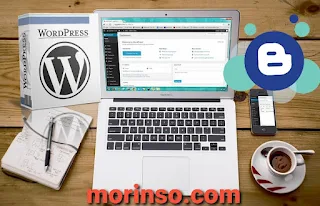أصبحت المدونات جزءًا لا يتجزأ من عالم الإنترنت، حيث توفر منصة للأفراد والشركات لمشاركة أفكارهم وأفكارهم وخبراتهم. من أشهر منصات التدوين هما Blogger وWordPress. إن Blogger، الذي أنشأته شركة Google، عبارة عن منصة مجانية وسهلة الاستخدام تتيح للمستخدمين إنشاء مدوناتهم الخاصة وتخصيصها. من ناحية أخرى، يعد WordPress منصة مفتوحة المصدر توفر المزيد من الميزات المتقدمة وخيارات التخصيص، ولكنها تتطلب معرفة تقنية أكثر قليلاً لاستخدامها.
تتمتع كلا المنصتين بمجموعة فريدة من الميزات والفوائد، مما يجعلها مناسبة لأنواع مختلفة من المدونين. سواء كنت مبتدئًا يتطلع إلى بدء مدونة بسيطة أو مدونًا ذو خبرة يبحث عن المزيد من الميزات المتقدمة، فإن Blogger وWordPress يوفران لك كل ما تحتاجه.
كيفية إنشاء موقع على منصة بلوجر؟
إنشاء موقع على بلوجر
لإنشاء موقع إلكتروني على منصة بلوجر يمكنك اتباع الخطوات التالية:
1- انتقل إلى موقع blogger.com وقم بتسجيل الدخول باستخدام حساب جوجل الخاص بك. إذا لم يكن لديك حساب في Google، فيمكنك إنشاء حساب مجانًا.
2- انقر على زر "مدونة جديدة" للبدء في إنشاء موقع الويب الخاص بك.
3- أعط مدونتك عنوانًا واختر نطاقًا مخصصًا (إذا كان لديك واحدًا) أو نطاقًا فرعيًا على blogspot.com.
4- اختر قالبًا لمدونتك. يمكنك أيضًا تخصيص القالب الخاص بك لاحقًا إذا كنت ترغب في ذلك.
5- اضغط على زر "إنشاء مدونة" للانتهاء من إنشاء موقع الويب الخاص بك.
6- بمجرد إنشاء مدونتك، يمكنك البدء في إنشاء منشورات وصفحات جديدة وتخصيص تخطيط موقع الويب الخاص بك وتصميمه ووظائفه من خلال زيارة لوحة تحكم Blogger.
7- انشر منشور مدونتك والآن أصبح موقع الويب الخاص بك مباشرًا وجاهزًا ليراه العالم.
كيفية إنشاء موقع على شبكة الانترنت على منصة ووردبريس؟
إنشاء موقع على ووردبريس
هناك عدة خطوات لإنشاء موقع على منصة ووردبريس:
1- شراء اسم نطاق واستضافة ويب: هذه هي الخطوة الأولى في إنشاء موقع على شبكة الإنترنت. يمكنك شراء اسم نطاق من خلال جهة تسجيل مثل GoDaddy أو Namecheap، واستضافة الويب من خلال موفر مثل Bluehost أو HostGator.
2- تثبيت WordPress: بمجرد إعداد اسم المجال الخاص بك واستضافة الويب، يمكنك تثبيت WordPress على المجال الخاص بك. يقدم العديد من موفري خدمات استضافة الويب إمكانية تثبيت WordPress بنقرة واحدة، مما يجعل هذه الخطوة سهلة للغاية.
3- اختر سمة: يحتوي WordPress على مجموعة واسعة من السمات المتاحة، المجانية والمدفوعة. يمكنك اختيار المظهر الذي يناسب التصميم والتخطيط الذي تريده لموقع الويب الخاص بك.
4- تخصيص السمة الخاصة بك: بمجرد اختيار السمة، يمكنك تخصيصها حسب رغبتك باستخدام أداة تخصيص السمات المدمجة. يمكنك تغيير الألوان والخطوط والتخطيط والمزيد.
5- إنشاء صفحات ومنشورات: يمكنك إنشاء صفحات ومنشورات لإضافة محتوى إلى موقع الويب الخاص بك. تُستخدم الصفحات عادةً للمحتوى الثابت مثل صفحة "نبذة عنا" أو صفحة "اتصل بنا"، بينما تُستخدم المنشورات لمحتوى المدونة.
6- تثبيت الإضافات: يحتوي دليل الإضافات في WordPress على آلاف الإضافات التي يمكنها إضافة وظائف متنوعة إلى موقع الويب الخاص بك، مثل تحسين محركات البحث (SEO) والأمان وغيرها الكثير.
7- انشر موقع الويب الخاص بك: بمجرد إضافة كل المحتوى الخاص بك وتخصيص المظهر الخاص بك، يمكنك نشر موقع الويب الخاص بك وجعله مباشرًا ليراه العالم.
8- صيانة وتحديث موقع الويب الخاص بك: يعد الحفاظ على تحديث موقع الويب الخاص بك أمرًا مهمًا للأمان ولضمان استمراره في العمل بشكل صحيح. قم بتحديث إصدار WordPress والموضوع والمكونات الإضافية بانتظام.
الاختلافات بين Blogger وWordPress
أهم الاختلافات الأساسية بين Blogger وWordPress هي:
1- الملكية والتحكم: إن Blogger مملوكة لشركة Google وتتحكم فيها، بينما WordPress عبارة عن برنامج مفتوح المصدر يمكن استضافته ذاتيًا أو استضافته بواسطة مزود طرف ثالث.
2- قابلية التخصيص: يتمتع WordPress بالكثير من المرونة وخيارات التخصيص، بما في ذلك القدرة على استخدام السمات والمكونات الإضافية المخصصة، بينما يتمتع Blogger بخيارات تخصيص أكثر محدودية.
3- تحسين محركات البحث: يعتبر WordPress بشكل عام أفضل لتحسين محركات البحث، لأنه يحتوي على المزيد من ميزات تحسين محركات البحث المضمنة ومجتمع أكبر من خبراء تحسين محركات البحث الذين يقومون بإنشاء سمات ومكونات إضافية لتحسين تحسين محركات البحث.
4- تحقيق الدخل: يتيح لك كلا النظامين تحقيق الدخل من مدونتك، ولكن لدى WordPress المزيد من الخيارات لتحقيق الدخل مثل الإعلان والتسويق بالعمولة والتجارة الإلكترونية.
5- الأمان: تتمتع مواقع WordPress ذاتية الاستضافة بخيارات أمان وتحكم أكثر من Blogger. يخضع Blogger لبروتوكولات أمان Google، ولكن قد يكون موقع الويب الخاص بالمستخدم عرضة للخطر في حالة حدوث أي انتهاكات أمنية.
